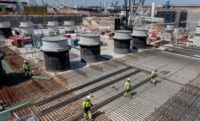As COVID-19 statistics climb in the United Kindgom, and businesses, including construction sites, go into lockdown to prevent further spread, the government has taken key steps to ease financial pain for companies and workers.
Chief Finance Minister Rishi Sunak announced on March 26 programs to defer $37 billion of tax payments until end of the year, create $407 billion of corporate loans and guarantees, and provide $31,000 cash grants for small businesses.
Also introduced was a measure to support self-employed workers that is equivalent to what has been provided to staff on companies' payrolls, which together would cover 80% of the entire national workforce to a limit of about $3,000 per month, for at least three months.
Meanwhile scenes of construction workers on crowded metro trains in London days after severe restrictions on movements, has caused new public uproar. Health Secretary Matt Hancock blamed the rush-hour crowding on Mayor Sadiq Khan's closure of numerous train services rather than the government’s failure to close construction sites.
But having shut Transport for London construction sites on March 24, Khan again urged the government “to ban non-safety construction work during this period.” He said that one-third of metro staff now are unavailable for work and general passenger traffic had already fallen to more than 90% below normal.
The U.K.'s largest contractorm, Balfour Beatty PLC, suspended payments of dividends to shareholders despite having $488 million in net cash and $463 million of available loans. At the same time, the company’s chairman-CEO and directors have agreed to take a 20% pay cut during the crisis.
Balfour Beatty is keeping its U.K. sites open where it can comply with officially sanctioned, health guidance issued on March 24 by the umbrella industry association, Construction Leadership Council. In its two other main markets, the U.S. and Hong Kong, the company is operating in line with local official guidance.
U.K. contractor Mace Group, on March 24, began temporarily shutting all its U.K. and continental European offices and sites. “Unless we are certain sites can operate safely and in accordance with guidance we will not re-open them,” said CEO Mark Reynolds.
Widespread disruption of work around the world has led to an intense interest in how the pandemic is covered in construction contracts. The rapid spread of COVID-19 appears to qualify for the force majeure definition of unforeseeable circumstances, which changes the performance of contractual obligations.
But at least in English law, the term has no specific meaning and needs spelling out in each contract, according to new guidance by law firm Wedlake Bell LLP prepared for the trade association BuildUK.
While construction companies search for relief from force majeure clauses, the government is urging public procurement bodies not to permanently disrupt projects but to “work with the supplier to amend or vary contracts instead."
And in Austria, the country's largest contractor Strabag SE began reopening domestic sites on March 27, 10 days after ordering them closed. “In the coming days we will look at each of our over one thousand construction sites in Austria to see whether and how the health precautions can be kept,” said CEO Thomas Birtel.
Which sites can open will depend on the extent of supply chain disruption caused by border closures within the European Union and around it, which were introduced to suppress virus transmission.





